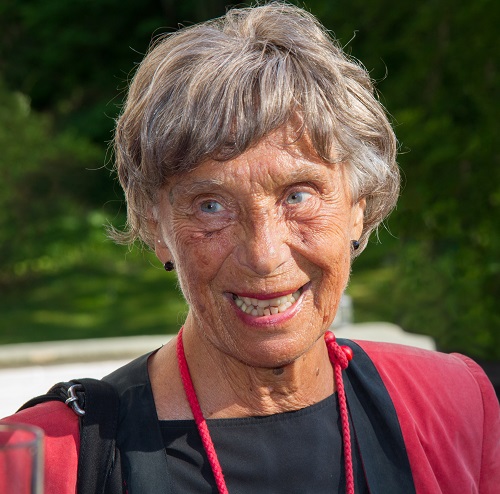Historian of Women and Gender; AHA Honorary Foreign Member
 Ida Blom was a pioneering figure in the field of women’s and gender history. She was a member of the first generation of second-wave feminist historians whose scholarship, institution building, and mentoring established the legitimacy and the permanence of the field.
Ida Blom was a pioneering figure in the field of women’s and gender history. She was a member of the first generation of second-wave feminist historians whose scholarship, institution building, and mentoring established the legitimacy and the permanence of the field.
Born in Copenhagen, Denmark, in 1931, Blom matriculated at the University of Bergen in Norway in 1954. She joined the history faculty as a lecturer there in 1961 and was the only woman in her department for nearly 30 years. She became professor emerita in 2001. Her doctoral dissertation (1972) examined a dispute between Norway and Denmark over the status of Eastern Greenland, a subject that made international relations an enduring interest for her. She turned to women’s history after a conversation in the early 1970s with some women who were protesting Norway’s entry into the European Union alerted her to the absence of women in leadership positions in that organization. “I had never thought of this before,” she told Alice Kessler-Harris in a December 2006 interview in Perspectives. “To my amazement I discovered that in France, where I had spent some years of my youth, women got the vote only in 1944. Also I realized that I had been teaching history for more than 10 years without even mentioning, even knowing, that women did not have the same civil rights as men[.]”
Blom devoted the rest of her professional career to the study of women, opening new ground for historians with books on women’s reproductive rights, conditions of birthing, caregiving, venereal disease, and politics. Her first book on reproductive rights appeared in 1980; her last book was Medicine, Morality, and Political Culture: Legislation on Venereal Disease in Five Northern European Countries, c. 1870–1995 (2012). Blom was also a brilliant and generous collaborator. Working with colleagues from India, Japan, and South Korea, she organized a panel at the UN Decade for Women Conference in Beijing in 1995, the papers of which were later published in the Journal of Women’s History. She was part of a team of 10 Norwegian and Danish historians who produced a three-volume world history of women. Among other of her co-edited volumes is one she did with Karen Hagemann and Catherine Hall, Gendered Nations: Nationalisms and Gender Order in the Long Nineteenth Century (2000).
As the authorship of that volume suggests, Blom was part of a large international network of feminist historians; her scholarship and her professional affiliations transcended national boundaries. So did her institution building. She was one of the founding members, in 1983, of the Nordic Women’s and Gender History conferences and a co-founder, as well, of the International Federation for Research in Women’s History. She served as president of that group from 1987 to 1995, during which time she played a key role in bringing women’s history to the attention of the International Committee for Historical Sciences.
Blom’s work received well-deserved international recognition. She was a member of the Norwegian Academy of Sciences and Letters; a member of the Royal Swedish Academy of Letters, History, and Antiquities; and an honorary foreign member of the American Historical Association (2006). In 2009, the Norwegian Association for Women’s Rights awarded her its Gina Krog prize. In 2013, the University of Bergen held the Ida Blom Conference on gender and citizenship, recognizing that her “groundbreaking work on citizenship, women’s suffrage and women’s health issues has inspired academics in Norway and abroad and has also had great public impact.” A book of the conference papers, including Blom’s (“Troubled and Secure Gender Identities in a Changing Society: Norway at the End of the Long Nineteenth Century”), came out in 2016 as Gendered Citizenship and the Politics of Representation (edited by Hilde Danielsen et al.).
Ida Blom was a prominent figure in international history circles. She enabled conversations across the lines of nations and cultures (it helped that she spoke German, French, and English, as well as some Scandinavian languages) and across generations. Natalie Zemon Davis remembers, “Whenever I saw Ida Blom . . . she was surrounded by young scholars to whose projects she was responding with interest and to whose future she gave encouragement. She was a beacon for the new scholarship on women and gender throughout the Scandinavian lands, but also for scholarship with a critical edge. She was a fighter when it was needed, but also gracious and generous when she won.”
Joan Wallach Scott
Institute for Advanced Study (emerita)

This work is licensed under a Creative Commons Attribution-NonCommercial-NoDerivatives 4.0 International License. Attribution must provide author name, article title, Perspectives on History, date of publication, and a link to this page. This license applies only to the article, not to text or images used here by permission.
The American Historical Association welcomes comments in the discussion area below, at AHA Communities, and in letters to the editor. Please read our commenting and letters policy before submitting.
Tags: In Memoriam Women, Gender, Sexuality
Comment
Please read our commenting and letters policy before submitting.






